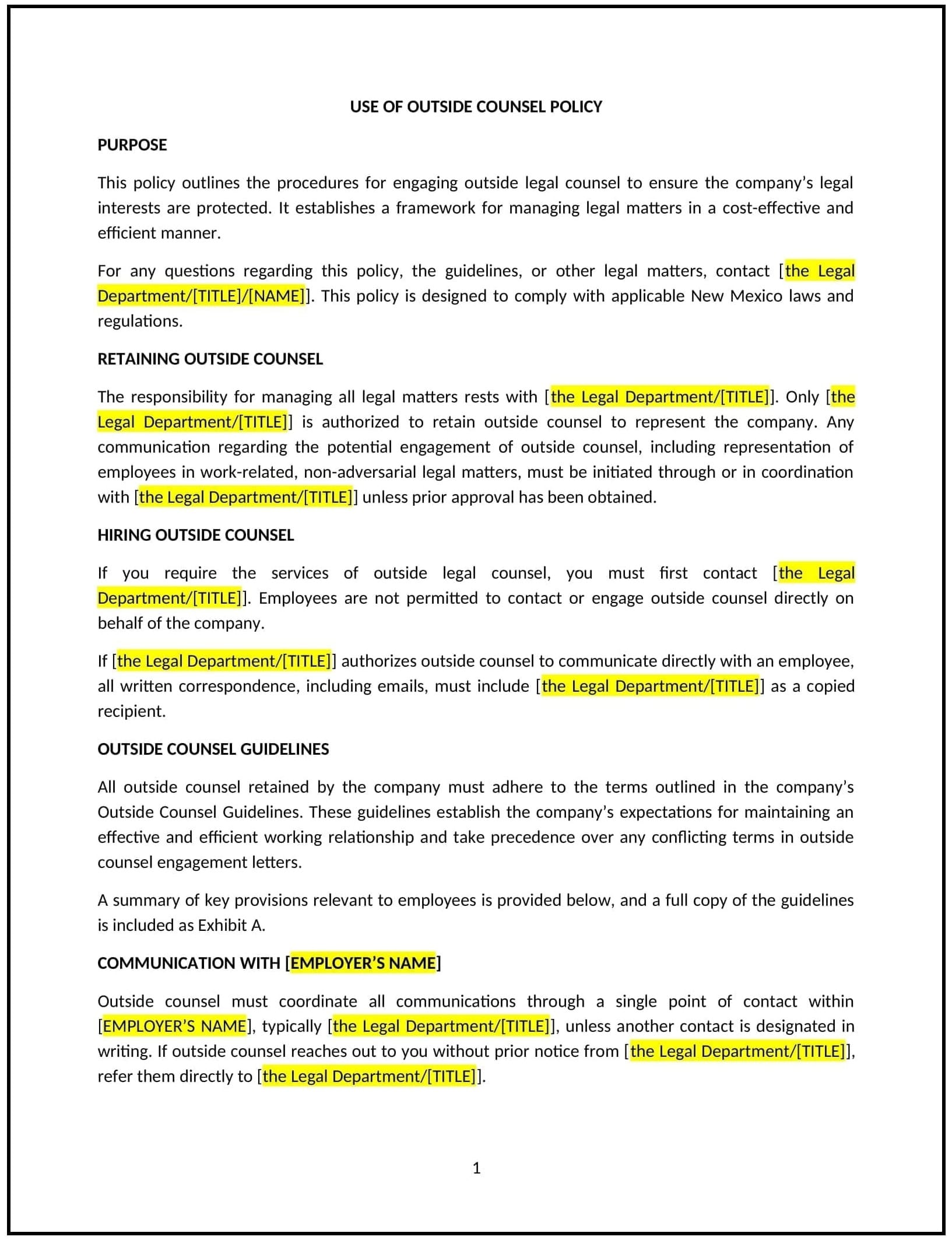Use of outside counsel policy (New Mexico): Free template
Got contracts to review? While you're here for policies, let Cobrief make contract review effortless—start your free review now.

Customize this template for free
Use of outside counsel policy (New Mexico)
A use of outside counsel policy helps New Mexico businesses define when and how to engage external legal professionals for advice, representation, or specialized services. This policy establishes guidelines for selecting, managing, and compensating outside counsel to ensure consistency and cost-effectiveness while addressing specific legal needs. It is designed to promote clear communication, manage legal costs, and ensure that legal services align with the company’s business objectives.
By adopting this policy, businesses in New Mexico can optimize their use of outside counsel, mitigate legal risks, and maintain control over their legal expenses.
How to use this use of outside counsel policy (New Mexico)
- Define the scope of services: Specify when the use of outside counsel is appropriate, including scenarios such as specialized legal advice, litigation, or compliance matters.
- Set selection criteria: Establish the criteria for selecting outside counsel, including factors such as expertise, experience, cost-effectiveness, and familiarity with New Mexico laws and regulations.
- Implement approval processes: Outline the steps for obtaining approval to hire outside counsel, ensuring that the engagement aligns with business needs and budget.
- Define compensation terms: Clearly specify the payment structure, including hourly rates, retainer agreements, or flat fees, and establish guidelines for managing costs.
- Establish communication protocols: Ensure regular communication between the business and outside counsel, including reporting and updates on legal matters.
- Monitor performance: Regularly evaluate the effectiveness and efficiency of outside counsel, ensuring that the engagement meets business objectives and delivers value.
- Review and update the policy: Periodically review the policy to reflect changes in legal needs, regulatory requirements, or business objectives.
Benefits of using this use of outside counsel policy (New Mexico)
This policy provides several benefits for New Mexico businesses:
- Promotes cost control: By setting clear guidelines for hiring and managing outside counsel, businesses can better control legal expenses and prevent cost overruns.
- Enhances legal expertise: Businesses can access specialized legal knowledge and resources when needed, ensuring high-quality legal representation and advice.
- Improves efficiency: With defined processes and approval protocols, businesses can engage outside counsel more quickly and effectively, minimizing delays in addressing legal issues.
- Aligns legal strategy with business objectives: By managing external legal services, businesses can ensure that legal actions align with their broader business goals.
- Builds stronger relationships: A structured approach to working with outside counsel fosters clearer communication and stronger working relationships, leading to more effective legal support.
Tips for using this use of outside counsel policy (New Mexico)
- Communicate the policy clearly: Ensure employees and managers are familiar with the policy and understand when and how to engage outside counsel.
- Regularly assess performance: Conduct regular reviews of outside counsel performance to ensure the services provided align with business goals and meet expectations.
- Keep accurate records: Maintain clear records of all engagements with outside counsel, including billing details, scope of work, and communications, for auditing and cost control purposes.
- Establish guidelines for cost management: Set budget limits and establish approval processes to keep legal costs within reasonable boundaries.
- Stay updated on legal trends: Regularly review the policy to ensure it reflects changes in legal practices or regulations, particularly those specific to New Mexico.